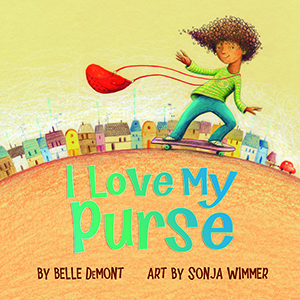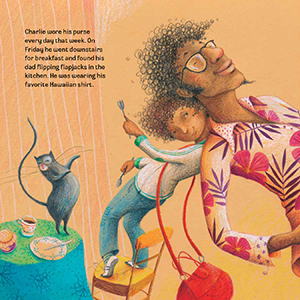| ________________
CM . . .
. Volume XXIV Number 12. . . November 24, 2017
excerpt:
Charlie inherited a purse from his grandmother. A beautiful red purse with a long strap, strong handles, and a sturdy button to keep it closed, and of course, it had lots of room. For a long time Charlie kept the purse in his closet, only trying it on in the privacy of his own room. But one day he decides that enough is enough, and he decides to finally wear the purse to school. While many of the children don’t quite understand why Charlie would choose to put everything in a purse instead of a backpack, over time he convinces them all that his purse is both practical and fashionable!
First of all, this is one book in which the male protagonist is not wearing a dress (the boy-in-a-dress trope is very prominent as a way of emphasizing gender play in childhood), but rather uses another accessory that can be read as feminine, but that also has a history of being read outside of a feminine space. The second aspect of this book that makes it unique within the field is the inclusion of a young black man as the protagonist. He lives in a single-parent household as well, but his father is not an adversary of Charlie’s decisions regarding wearing his purse to school, which is actually very refreshing. In particular, this book chooses not to play with pronouns or engage with the gendered nature of accessories (at least not explicitly as some do). Instead, DeMont and Wimmer have chosen to engage in discussion about the purse as a fashion choice that allows Charlie to remain free of anyone labelling him in any gendered sense. Charlie is repeatedly asked about his purse, and he responds, but instead of those questioning gendering Charlie, the most they ask is in regard to the “normal” activities that boys engage in: “Boys ride skateboards and read comic books. We don’t wear bright red purses!” But once Charlie responds, his critics at most go on with their normal daily routine(s). I Love My Purse is refreshing and enjoyable, full of colorful and eye-catching illustrations. There is a good amount of diversity to keep the book from falling into a stereotypically white construct like so many others that look to gender or sexuality. Recommended. Rob Bittner has a PhD in Gender, Sexuality, and Women’s Studies (SFU), and is also a graduate of the MA in Children’s Literature program at The University of British Columbia in Vancouver, BC. He loves reading a wide range of literature, but particularly stories with diverse depictions of gender and sexuality.
To comment
on this title or this review, send mail to cm@umanitoba.ca.
This Creative Commons license allows you to download the review and share it with others as long
as you credit the CM Association. You cannot change the review in any way or use it commercially. Commercial use is available through a contract with the CM Association. This Creative Commons license allows publishers whose works are being reviewed to download and share said CM reviews provided you credit the CM Association.
Next Review | Table of Contents For This Issue - November 24, 2017 |

 As with many similar books that seek to subvert masculine ideals in relation to children (just look at
As with many similar books that seek to subvert masculine ideals in relation to children (just look at